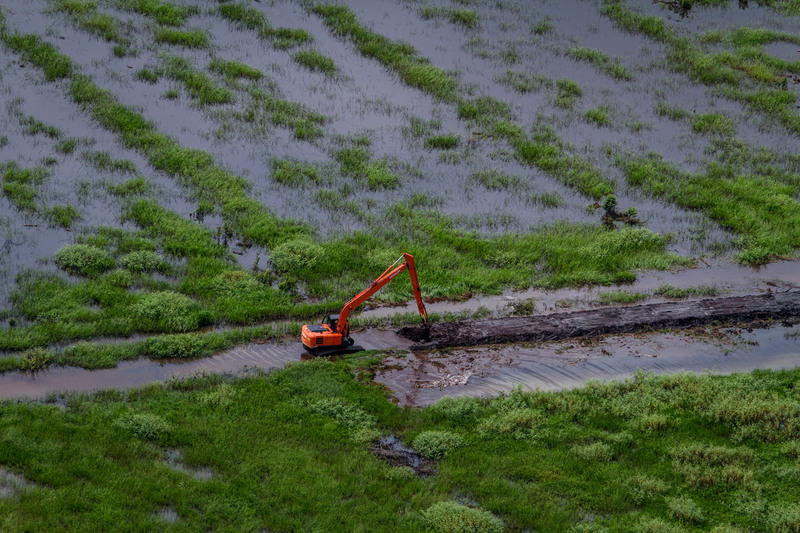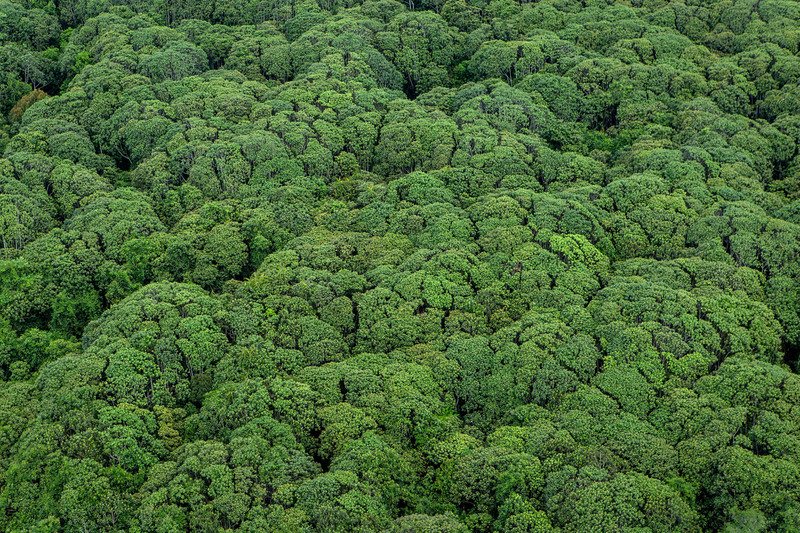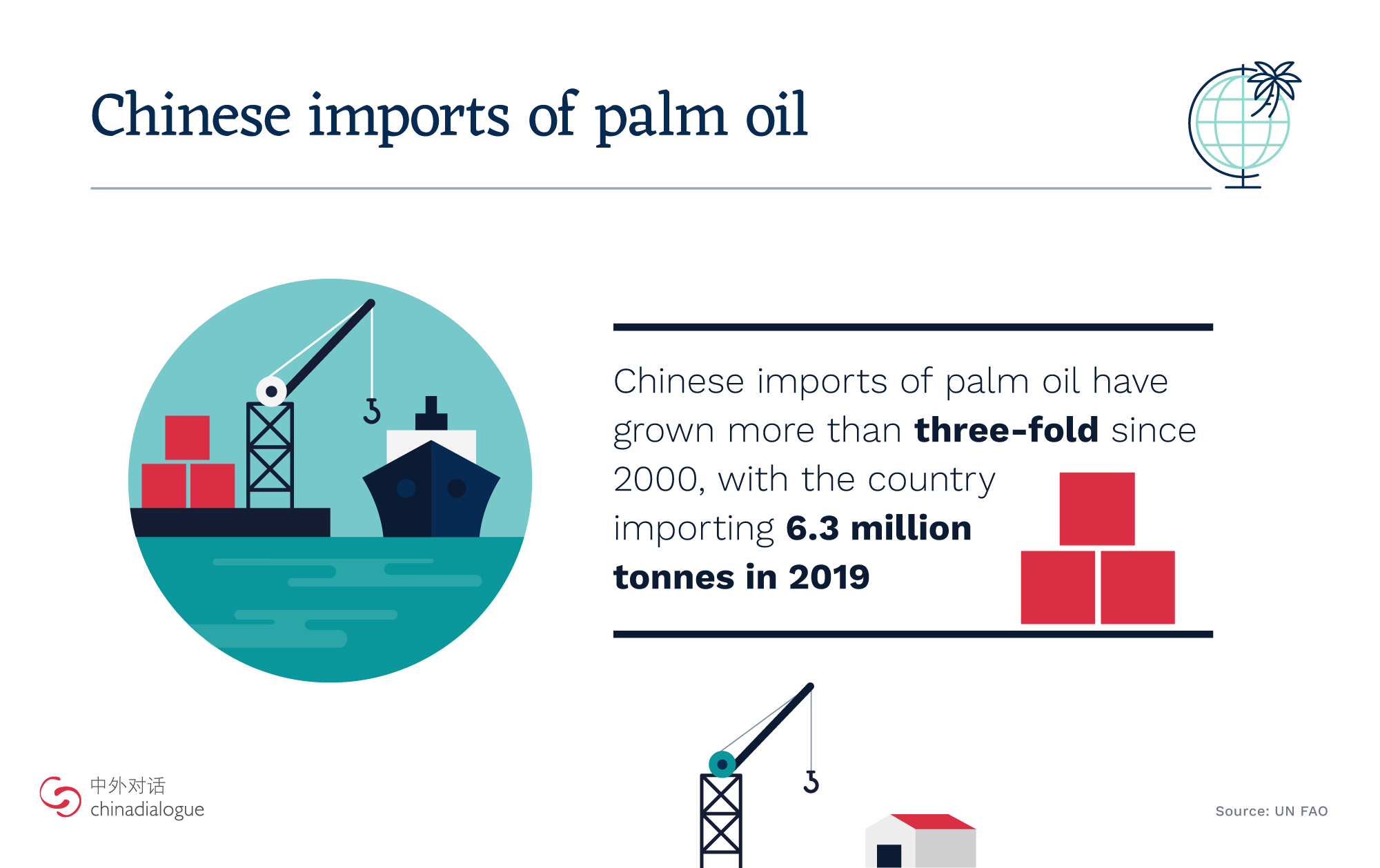Certification standards are criteria that palm oil producers, products or supply chains must meet in order to be credited as “sustainable”.
In most schemes, independent auditors verify compliance with the standard’s criteria by checking for “indicators” listed in it. The idea is that certified producers and products gain a market advantage and that this promotes wider sustainability by driving up standards across the industry.
Some standards apply to palm oil used in food, while others are geared towards the biofuel sector. About half of the palm oil imported into the EU in 2018 was destined for biodiesel. This was in part because the EU Renewable Energy Directive of 2009 required 20% of energy used in the EU to be renewable by 2020. This kind of biofuel certification is set to decline as the EU no longer considers palm oil a renewable fuel because of the deforestation linked to its production.
Here is a look at the main certification schemes and their effectiveness.
Roundtable on Sustainable Palm Oil (RSPO)
The RSPO runs the main certification scheme, covering about one-fifth of globally traded palm oil. It brings together producers, processors and traders, consumer goods manufacturers, retailers, banks and investors, and environmental and social non-governmental organisations (NGOs). The RSPO most recently strengthened its standard (called its “principles and criteria”) in 2018. Under the new rules, certified producers cannot deforest any land or plant oil palms on peatland. The new standard also increases protection of human rights defenders, and of worker and community rights. To become certified, applicants must comply with the key indicators of all criteria. They must then be audited annually and assessed by an RSPO-accredited certification body every five years.
Palm Oil Innovation Group (POIG)
POIG was set up by progressive companies and NGOs aiming to improve on the RSPO standard. It has produced its own standards (“charters”), for palm oil producers, for retailers and manufacturers, and for traders and processors. POIG’s work encouraged the RSPO to adopt stronger requirements when it revised its standard in 2018. Where POIG has led the way in verifying that palm oil is grown without deforestation, development on peatlands, human rights violations or exploitation of workers, the RPSO has followed. POIG has also identified weaknesses in the new RSPO standard relating to pesticides, genetically modified organisms, workers’ conditions and indirect sourcing of illegally produced oil palm fruit.

An excavator builds an access road and canal through peat-rich wetland to make way for an oil palm plantation in West Kalimantan, Indonesia (Source: Ulet Ifansasti / Greenpeace)
Roundtable on Sustainable Biomaterials (RSB)
RSB launched its certification scheme in 2011 to encourage sustainable production of biofuels and other biomaterials. Applicants choose their own RSB-approved auditor to verify compliance with the RSB principles and criteria, which cover legal, environmental, social and management issues. While the minimum requirements require full compliance, not all principles and criteria apply equally to all operators. RSB uses a risk-based approach to determine which sustainability issues to address and how frequent later audits should be.
Rainforest Alliance Sustainable Agriculture Standard
The Rainforest Alliance has exclusive rights to use this standard as the basis for its farm certification system. The standard, which was developed by the Sustainable Agriculture Network, covers planning and management, biodiversity conservation, natural resource conservation (which includes greenhouse gas emissions) and wellbeing of workers and local communities. To be certified, palm oil producers must meet all critical criteria and 50% of “level C” criteria. In each following year, they must meet more criteria, so by year 6 they must meet all “level C” and “level B” criteria, as well as half of the “level A” criteria.
High Carbon Stock (HCS) Approach
The HCS Approach is not strictly a certification scheme. Its standard can apply to uncertified producers who supply companies that have committed to eliminate deforestation in their operations and supply chains, including through voluntary “No Deforestation, No Peat, No Exploitation” commitments. The HCS Approach is used to distinguish forests with high levels of carbon and biodiversity – that should be protected – from degraded areas with less carbon and biodiversity that can be developed. It has both environmental and social requirements – such as using free, prior and informed consent processes to respect the rights of local communities.
International Sustainability & Carbon Certification (ISCC)
ISCC has two standards relevant to palm oil. The ISCC EU standard was developed for biomass and bioenergy industries to show compliance with the EU Renewable Energy Directive. It focuses on reduction of greenhouse gas emissions, sustainable land use, protection of nature and social sustainability. The ISCC PLUS standard allows producers with ISCC EU certification to also be certified for the food and animal feed sectors. ISCC PLUS does not allow production on land with high biodiversity value or high carbon stock. It also covers issues such as: human rights, labour rights and land rights; workers’ health, safety and welfare; community relations; legal compliance; good management practices; protection of soil fertility and water; reduction of emissions; and minimal use of pesticides. Unlike schemes for which all criteria are mandatory, the ISCC system only requires applicants to meet all “major” criteria and at least 60% of “minor” ones.
Malaysian Sustainable Palm Oil (MSPO)
Malaysia introduced this voluntary standard in 2013 to help producers who could not afford RSPO certification. The standard covers issues including: management; transparency; legal compliance; social responsibility; health, safety and employment conditions; new planting; and the environment and biodiversity. As well as general principles, it has specific ones for independent and organised smallholders, plantations and oil palm mills. It aligns strongly with Malaysian laws and regulations, and applicants must comply fully with all criteria to gain MSPO certification.
Indonesian Sustainable Palm Oil (ISPO)
Indonesia introduced this standard in 2011 as part of efforts to boost its palm oil on global markets and reduce greenhouse gas emissions. Adherence to the standard is mandatory for oil palm growers and millers, who must comply with all of its criteria to be certified. The standard is based on Indonesia’s legal and regulatory framework.

Lush peatland forest canopy in Central Kalimantan, Indonesia, showing what could be lost if the palm oil industry continues with business as usual (Source: Ulet Ifansasti / Greenpeace)
Assessing the standards
In 2017, human rights organisation Forest Peoples Programme (FPP) compared seven sustainability standards. It concluded that the Roundtable on Sustainable Palm Oil has the strongest requirements (score: 102), followed by the Roundtable on Sustainable Biomaterials (91); Sustainable Agriculture Network (79); International Sustainability & Carbon Certification (68); High Carbon Stock Approach (66); Malaysian Sustainable Palm Oil (62); and Indonesian Sustainable Palm Oil (34).
FPP says the Indonesian scheme “has the weakest certification process and carries the least requirements on social issues”, doing little to protect human rights and community livelihoods. It adds that the Indonesian and Malaysian schemes provide “very weak access to remedy” in cases of certification holders failing to meet the respective criteria. It says the RSPO and RSB have the best human rights protections and social safeguards. Notably, the study took place before the RSPO strengthened its standard considerably in 2018.
While non-governmental organisations have welcomed the new, improved RSPO standard, they also point to ongoing concerns about certification audits, complaint procedures and sanctions for non-compliance. One issue is the conflict of interest created because palm oil producers themselves pay the auditors that assess their compliance with RPSO criteria. The Environmental Investigation Agency says the RSPO’s audits “have consistently failed to pick up non-compliance with the RSPO standard”. Meanwhile, FPP says RSPO allows its members to buy palm oil from sources that the RSPO has itself condemned.
In the absence of strong national legal and regulatory frameworks, certification remains a key way of promoting sustainability in the palm oil sector. However, there are big questions about whether it has been able to lift people out of poverty or conserve forests and biodiversity. What works in one place, may have limited benefits elsewhere. And as one recent study showed, tree loss was higher in Indonesian oil palm plantation areas that were certified sustainable than those that were not.

Another issue facing certification is its limited engagement with smallholders, as opposed to large plantations: the Rainforest Alliance says only 4% of smallholders who produce oil palm are certified. For many, the cost of certification is too high a barrier. To address this, some schemes include group certification for smallholders. The RSPO, meanwhile, has developed a separate standard for independent smallholders, for adoption in November 2019.
One of the biggest challenges for sustainability in the palm oil sector is consumer demand. The Environmental Investigation Agency warns that there are still not enough buyers for the palm oil already certified as sustainable. To date, European demand for sustainability has driven change in the industry and now 69% of European palm oil imports are certified. It will likely require changing attitudes in other markets, such of those of China and India, to ensure future growth in the proportion of palm oil that is sustainable.
This article is part of our ongoing series on palm oil. Explore the series to date here.









